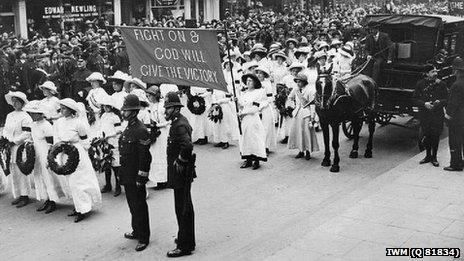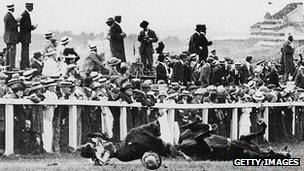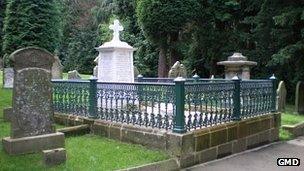Suffragette Emily Davison centenary marked in Morpeth
- Published

Crowds lined the streets of Morpeth as the coffin passed, escorted by suffragettes wearing white for "purity of intention"
The centenary of the death of the only suffragette killed during the campaign for votes for women is being marked in her home county of Northumberland.
Emily Davison was fatally injured when she ran out in front of King George V's horse during the 1913 Epsom Derby.
Following a funeral service in London, her coffin was brought by train to Morpeth for burial in the family plot.
A commemoration service is being held in the town to coincide with International Women's Day, and afterwards flowers are being laid on her grave.
'Lawless lassie'
It marks the start of a series of "Emily Inspires" events in the run up to the anniversary of her death on 8 June, four days after the injuries sustained at Epsom.

Emily Davison was knocked down by the King's horse during the 1913 Epsom Derby
She had gone on the track during the race in what is thought to be an attempt to pin a suffragette banner on Anmer, the horse of King George V.
Davison's family was based in Northumberland, although her parents had moved to London shortly before her birth in October 1872.
Connections with the county remained strong, and following her father's death the family returned to Longhorsley.
After she became active in the suffragette movement she was known locally as "the lawless lassie".
A tablet at the foot of Emily Davison's headstone is inscribed with the motto "Deeds not Words" - a tenet she seemed determined to live by.
'Force fed'
In 1906 she joined the Women's Political and Social Union (WPSU) - the organisation founded by Emmeline Pankhurst - and later left her teaching post to work full-time for the movement.
Embarking on a campaign of civil disorder, she was arrested and imprisoned on a number of occasions for offences ranging from criminal damage to arson.
She went on hunger strike and was force-fed a total of 49 times, which had a serious impact on her health. She would often return to Northumberland to recuperate.
Forthcoming events in Morpeth to mark the centenary of her death include a new play, a writing competition, and a history exhibition.
In June, bunting in the suffragette colours - purple, green and white - will adorn the streets, and there will be a floral display in Carlisle Park.
Penni Blythe-Jones, from the Emily Wilding Davison Working Group, said they were aimed at acknowledging the whole person.
She said: "It might say 'words not deeds' on her tomb, but she was also a prolific wordsmith, a very good sportswoman and singer and piano-player.
"There was so much more to her than the moment of her death."
'Ultimate sacrifice'
Its controversial nature - some said it harmed the suffragette cause - continues to elicit a mixed reaction.

Emily Davison is buried in the family plot in the churchyard of St Mary the Virgin
"I've had people call her a terrorist to me, some still feel very strongly and negatively about her," Ms Blythe-Jones said.
"There are others who say she changed our world.
"The centenary of Emily's death is an opportunity to mark not only the remarkable life of a true Northumberland lass, but of a suffragette who made the ultimate sacrifice in standing up and fighting for the rights of women."
- Published5 February 2013
- Published11 February 2012